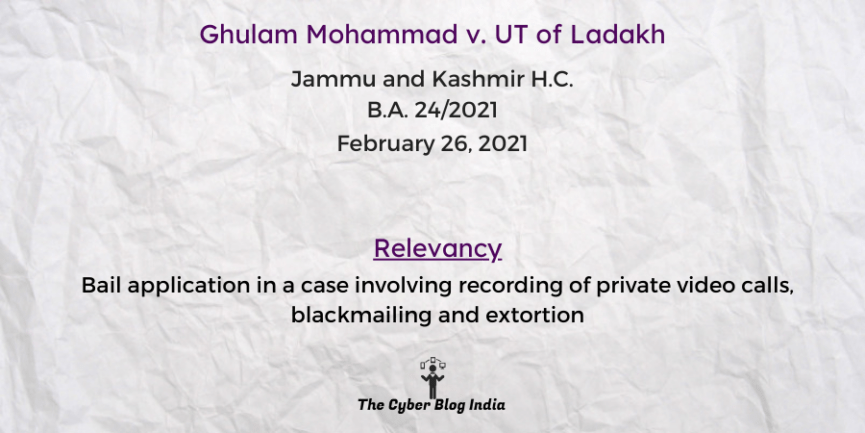Ghulam Mohammad v. UT of Ladakh

Ghulam Mohammad v. UT of Ladakh
In the High Court of Jammu & Kashmir
B.A. 24/2021
Before Justice Sanjay Dhar
Decided on February 26, 2021
Relevancy of the case: Bail application in a case involving recording of private video calls, blackmailing and extortion
Statutes and Provisions Involved
- The Information Technology Act, 2000 (Section 67A)
- The Indian Penal Code, 1860 (Sections 292, 420, 506)
Relevant Facts of the Case
- The complainant registered a first information report alleging that the accused had promised to marry her, and during the subsistence of this promise, they used to have video calls.
- In these calls, the complainant was allegedly enticed to exhibit her private parts.
- The accused allegedly threatened to make recordings of these video calls viral unless the complainant paid Rs. 80,000.
Prominent Arguments by the Advocates
- The petitioner’s counsel submitted that the first information report resulted from differences that arose between the two lovers and that it was false and frivolous. Further, the accused only threatened to make the video viral; he did not follow through with his threat. Therefore, Section 67A of the Information Technology Act, 2000 does not apply.
- The respondent’s counsel argued that a young girl had been exploited, her private parts videographed and made viral, therefore such cases should be dealt with sternly, and no bail should be granted to the accused.
Opinion of the Bench
- The Court was of the view that, in the case diary, it was stated that the accused had already deleted the video clips, which may have been the obscene videos in question, from the mobile phone on which the video was alleged to have been recorded and would need to be retrieved. None of the offences the accused is charged for carries a sentence beyond seven years.
- Further, only Section 420 of the Indian Penal Code, 1860 and Section 67A of the Information Technology Act, 2000 are non-bailable. The complainant herself agreed that she was in love with the complainant, thus, there is merit to the petitioner’s counsel’s first argument.
Final Decision
- Application allowed.
- Bail granted.
This case summary has been prepared by Mehula Liza Pallathu, an undergraduate student at National University of Advanced Legal Studies, Kochi, during her internship with The Cyber Blog India in May/June 2021.
